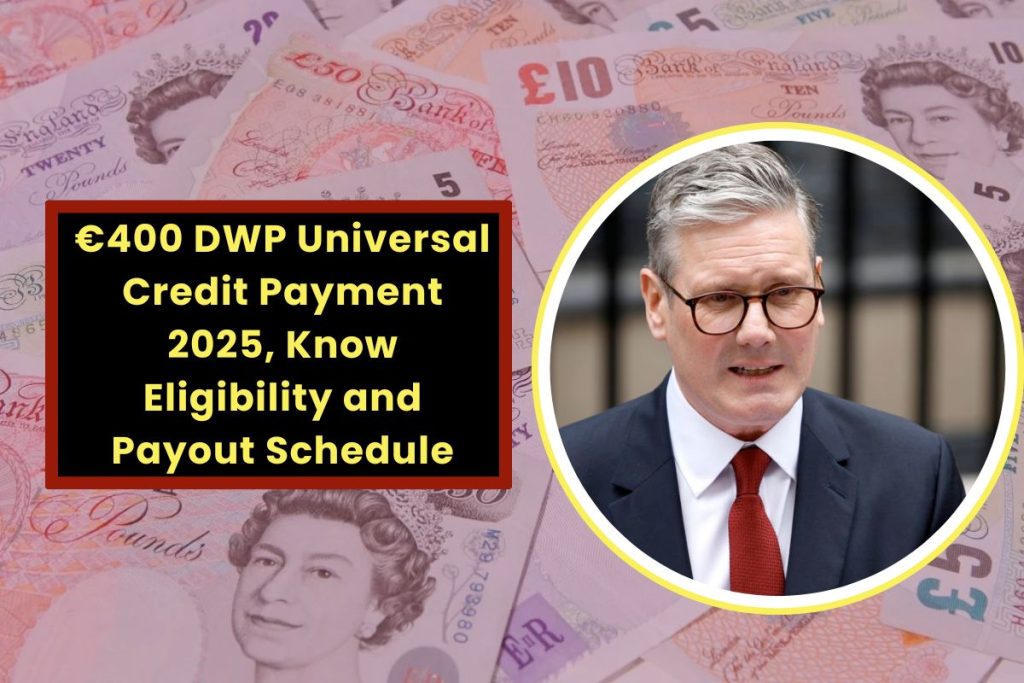For many households across the UK, 2025 hasn’t exactly been easy, contributed to several factors ranging from political instability in recent times, unfavourable economic policies, and migrants piling up, leading to unemployment and inflation. Prices of food are still high, energy bills continue to dent the pocket and inflation while slowing, is still hovering above comfort. So when news began to spread of a €400 Universal Credit payment arriving for some claimants, it’s no wonder people started paying attention. It is an initiative by the government to assist people in combating inflation and provide some relief. Since the advent of labours to power, subsidies and benefits are becoming enhanced as compared to previously. It seems to be an opportunity for the low-income holders to get the amount which can be used to finance their regular expenditure. It might not seem to be a great amount at a glance, but still €400 is a considerable amount for those who have been impacted by the economic distress.
While the DWP (Department of Work and Pensions) hasn’t exactly splashed this across billboards, the one-off support has been quietly making its way through the system, aimed at easing pressure for those who need it most. Process of disbursement will be completed in a span of two months, which has already commenced in the end of July. On-going payment deliveries have made the subject highlighted, and there are some perplexing inputs hovering around, which create a scenario of confusion for many. This piece offers detailed insight into the payment, eligibility, and time, so here is thekey information for the topic.
€400 DWP Universal Credit Payment 2025 : Overview
| Country | United Kingdom |
| Topic | DWP Universal Credit Payment 2025 |
| Amount | €400 |
| Authority | Department of Work and Pension |
| Payment Date | July to September |
| Domain | Finance |

Who’s Eligible for DWP Universal Credit Payment 2025
Let’s cut straight to the point: not everyone receiving Universal Credit will get this payment. The €400 is being directed at specific groups, mostly based on need, existing benefits, and how your income looks on paper.
Here’s what has been known so far:
- Low-income households already on Universal Credit and not receiving other forms of cost-of-living payments are more likely to qualify.
- No need to apply separately. If you’re eligible, the payment should land automatically in your account.
- Those who’ve recently moved on to Universal Credit, particularly after changes in employment or housing status, may be included.
- Households with children, single parents, or disabled members are more likely to be prioritised.
But again, this is not a blanket payment. Just being on Universal Credit doesn’t mean you’ll see the money. The DWP is working from internal criteria and recent earnings reports to determine who qualifies.
Arrival time of €400 Payment by DWP
If you’re expecting this money, the timing is just as important as the amount. While there’s no official “universal” payout date, here’s what’s been happening:
Payments started rolling out in phases from late July 2025.
Most eligible claimants are expected to receive their €400 by mid-September.
You’ll receive a notice or message in your Universal Credit journal if you’re eligible, often a week or so before the payment lands.
Payments are made separately from your usual Universal Credit schedule, so don’t assume it’ll be lumped in with your regular benefits.
Probable Reasons for the Extra Support
It’s no secret that households across the UK are feeling squeezed. While the cost-of-living payments in 2023 and 2024 helped, many of those schemes have since ended. The government’s newer approach is to issue more targeted support, rather than broad handouts.
The €400 payout is meant to bridge the gap, not just to put money in pockets, but to help people catch up on rent, energy bills, or debts built up over the last two tough years.
For some, it’ll barely scratch the surface. For others, it might mean keeping the lights on or avoiding eviction. Either way, it’s a sign that even as major support schemes wind down, some relief is still on the table.
A Few Things to recognize about the payout
There are always a few wrinkles in schemes like this. First, if your circumstances change, for example, if you start a new job or move, it could affect your eligibility. Second, this payment doesn’t count as income, so it won’t reduce your other benefits.
Also worth noting: while it’s being described as €400, payments may be adjusted slightly based on your household setup or deductions (e.g., rent arrears or overpayment recoveries). It might be possible in some cases that the amount could be less than expected.
Conclusion
The €400 Universal Credit payment might not resolve every issue, but for a lot of families, it’s a sign that support hasn’t vanished altogether. It can aid in covering grocery bills, rent, or any other utility, but it is totally worth it in times when the cost of living is inflated.
If the eligibility criteria I met by you then keep updated about the universal credit information or notifications from DWP. Once you receive the money, you can use it the way you wish due to the absence of any conditions on it, but it is advised to have it utilized in a planned manner so that some relief from inflation can be felt, and this is the purpose of it.
FAQs
1. What makes one eligible to receive the Universal Credit Payment?
Universal credit payment is meant for every individual because it targets people with lower incomes who are finding it difficult to cope the inflation. It also aims to provide relief to those who have children or disabled individuals who are struggling to make ends meet.
2. How can an application for payment be submitted?
It does not work like that way, you are not required to fill out any form because the government have all the data, and if you fall into the eligibility criteria, then there will be payment disbursed to you automatically. It is handled by the department of work and pensions, so have the universal creditinformation updated regularly.
3. When will payments be delivered?
Payments will be made by September to all; it has already been made in the month of July. At present, payouts are delivered regularly, and if you fall in the eligibility, then you can expect you payment this month or by the next month, which is September. Remember that this payment will be distinct from the benefits delivered as social security.
4. If one gets this Credit Payment then is there going to be any impact on other benefits?
This is one one-time payment of €400, which is given as extra support to the needy ones by the government, and it has nothing to do with the regular benefits that you receive. They will remain unchanged because this one is additional and part of a different program.
| NLR News | Click Here |

Hello! I’m Kaylani , a professional content writer with a knack for breathing life into words. I have been providing high-quality, research-driven content in Sectors like Technology & Personal Finance . With a background in Finance Tech Management , I specialize in turning complex information into engaging content that resonates with a wide.
